My grasses, sedges, and bamboos: Alive, dead or in-between? Evaluating plants 2 months after Texas freeze
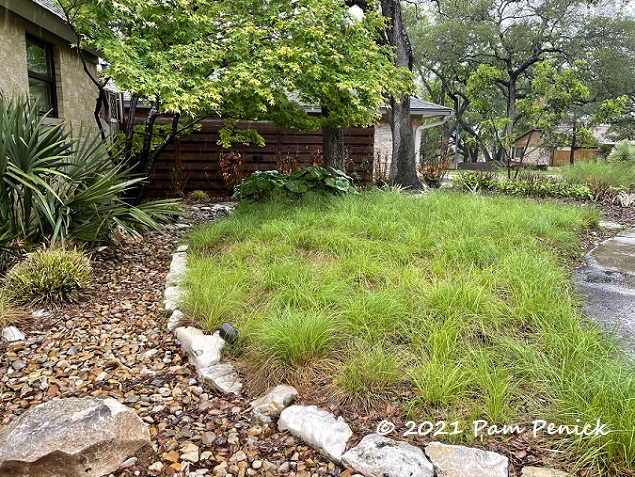
Today I’m taking a look at my grassy plants — my ornamental grasses, sedges, and bamboos. While I have no lawn at all, I grow a lot of clumping, shade-tolerant grasses as groundcovers, screening plants, and accent plants. Deer ignore fibrous grasses, and many varieties are tolerant of dappled shade and dry soil under all the live oaks in my garden.
But first, the backstory.
Texas gardeners are feverishly comparing notes about plant survivors and croakers after February’s Big Freeze. I’m doing the same and documenting how every plant in my garden fared. Please see my first post in this series for the introduction and for notes about my trees.
Asterisks indicate plants native to Texas. Plants that were stunted, maimed, or killed by the freeze are in bold, for easier searching.
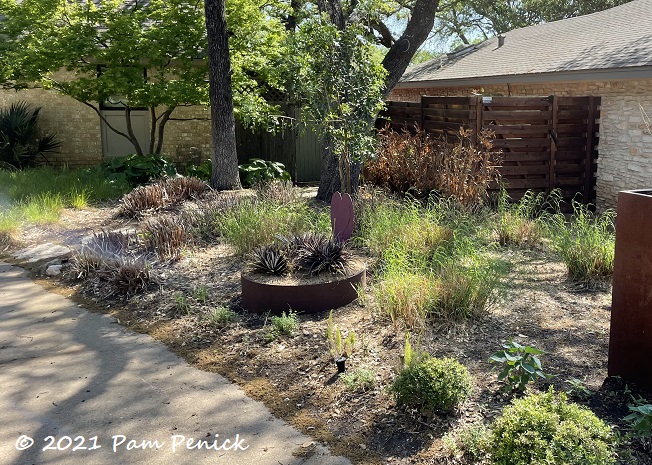
Grasses, Sedges, & Bamboos
- Bambusa multiplex ‘Alphonse Karr’ – Bamboo ‘Alphonse Karr’: It quickly turned brown and began dropping its leaves. After two months, new growth began emerging from the roots, so I cut the old growth to the ground.
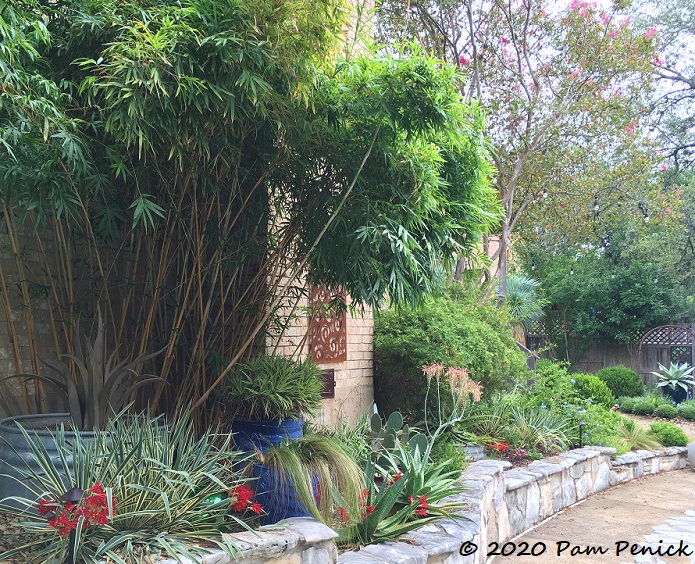
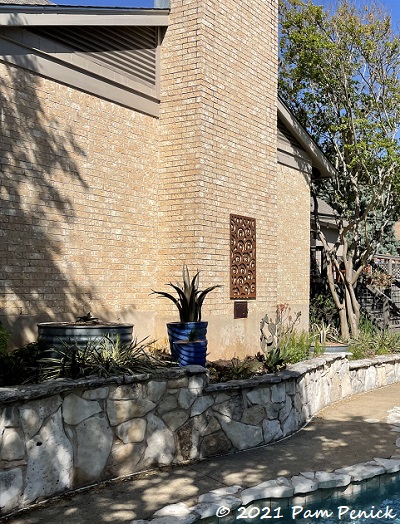
- Bambusa multiplex ‘Tiny Fern’ – Bamboo ‘Tiny Fern’: It quickly turned brown, although some canes remained green under the top growth. After two months, new growth began emerging from the roots, so I cut the old growth to the ground.
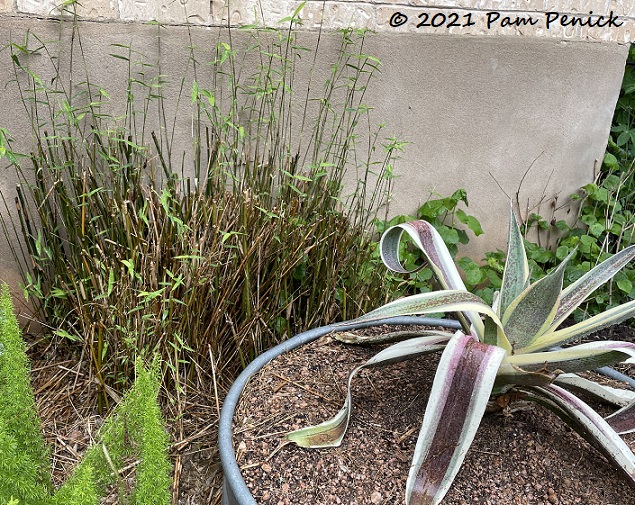
- Carex divulsa – Berkeley sedge: Totally unfazed.
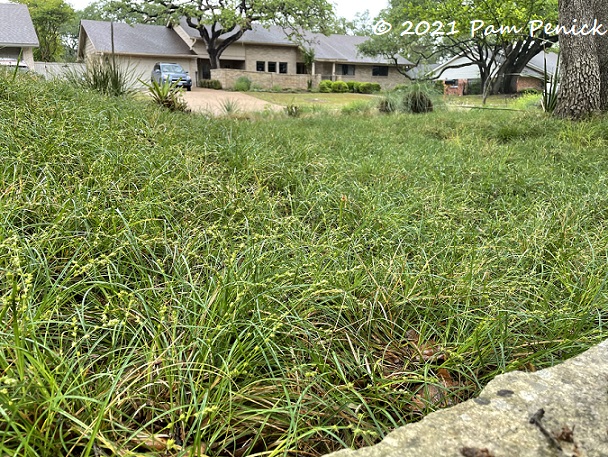
- Carex leavenworthii – Lawn sedge*: Totally unfazed.
- Carex oshimensis ‘Everillo’ – ‘Everillo’ sedge: Most suffered some burn damage to the outer leaves, which I cut off. The plants are slowly putting on new growth.
- Carex phyllocephala ‘Sparkler’ – Sparkler sedge: About 1-2 weeks post-freeze, they turned brown. But new growth appeared from the roots, so I cut them back, and they are regrowing well.
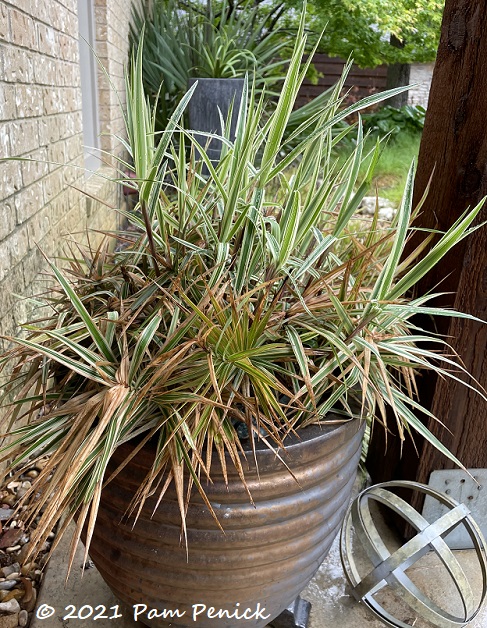
- Chasmanthium latifolium – Inland sea oats*: New growth was just emerging in mid-February, and that was killed to the ground (it’s normally dormant in winter, so no surprise). But it began putting up new growth almost immediately.
- Dianella ‘Clarity Blue’ – ‘Clarity Blue’ flax lily: Partly killed back but survived.
- Dianella tasmanica ‘Variegata’ – Variegated flax lily: Killed to the ground, even under blankets, but trying to come back from the roots. Prolonged hard freezes always knock this plant back to the roots (unless it’s well covered), and it struggles a long time to come back. Rather than wait it out this time, I bought new ones for the swath along my front-side path and planted them alongside the old ones, which I cut to the ground. If the old ones come back, great. If not, the new ones can take over. Even though variegated flax lily isn’t reliably winter hardy here, I find it worth replanting because it’s so drought tolerant, shade tolerant, and deer resistant.
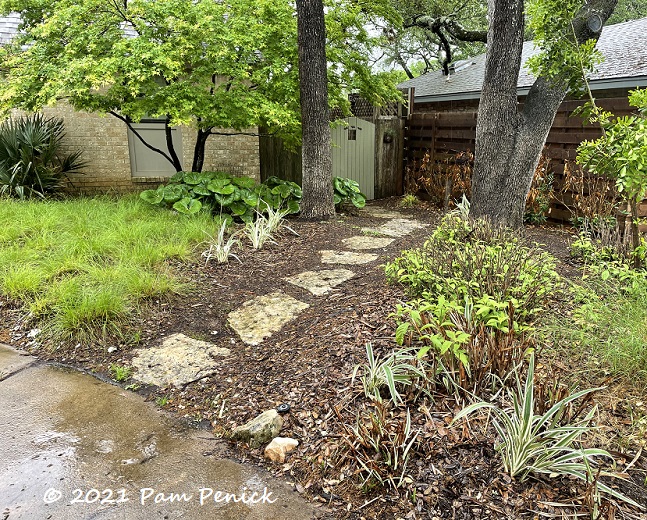
- Miscanthus sinensis ‘Variegatus’ – Variegated miscanthus: It was dormant during the freeze and quickly popped up after the thaw.
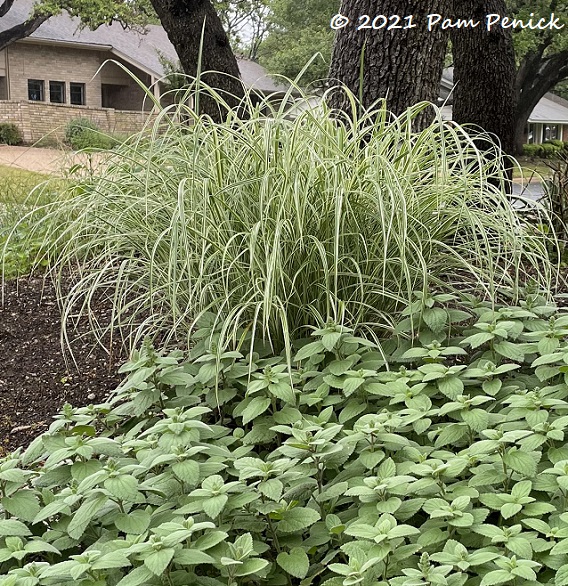
- Muhlenbergia dubia – Pine muhly*: It was dormant during the freeze and quickly popped up after the thaw.
- Muhlenbergia dumosa – Bamboo muhly: All my plants quickly went tan, and I watched for new growth along existing stems, as can sometimes happen after a hard freeze. Ultimately I concluded the stems were dead, but after about a month new growth emerged from the roots. I cut the old growth to the ground, and the plants are quickly regrowing. They look like overgrown Bermudagrass in this phase, but soon they’ll be tall and fluffy again — hopefully by midsummer.
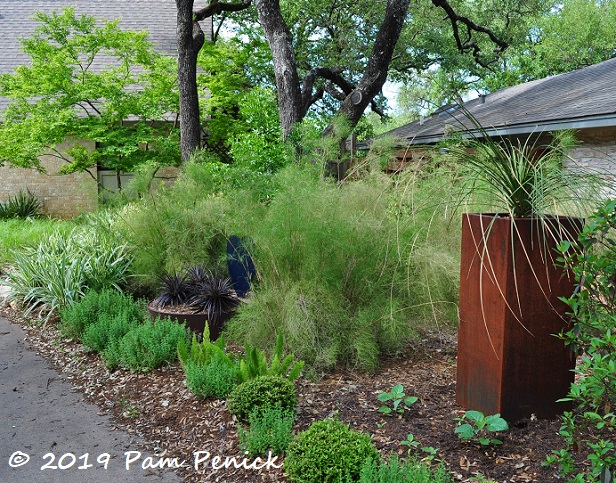
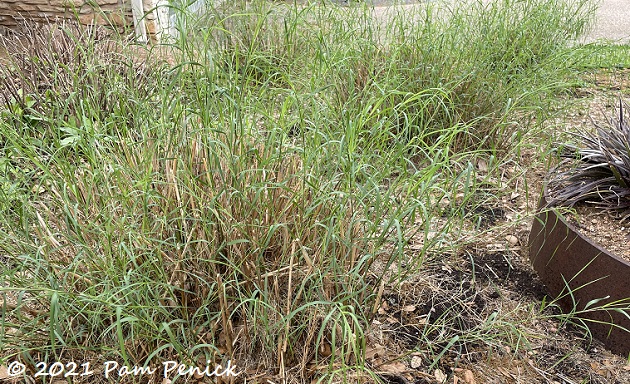
- Muhlenbergia ‘Pink Flamingos’*: It was dormant during the freeze and quickly popped up after the thaw.
- Nassella tenuissima – Mexican feathergrass*: Unfazed, I think. This is a short-lived grass, so I always lose a few established plants each spring but gain new, fast-growing seedlings.
- Pennisetum purpureum ‘Vertigo’: It was dormant during the freeze and is slowly regrowing from the roots, as per usual. Like its look-alike ‘Princess Caroline’, ‘Vertigo’ needs protection from late hard freezes in our area, so I typically wait until mid-March to cut back last year’s foliage. The old leaves protect the roots from the cold. I’m especially glad I waited this year. I’m sure the snow cover helped too.
Up next are Small Succulents, Cacti, Vines, Groundcovers, Bulbs, and a few Annuals. Click for my earlier posts about:
__________________________
Come learn about gardening and design at Garden Spark! I organize in-person talks by inspiring designers, landscape architects, authors, and gardeners a few times a year in Austin. These are limited-attendance events that sell out quickly, so join the Garden Spark email list to be notified in advance; simply click this link and ask to be added. Season 8 kicks off in fall 2024. Stay tuned for more info!
All material © 2025 by Pam Penick for Digging. Unauthorized reproduction prohibited.


These notes & lists are so helpful both for comparing notes as our yards recover & for resources for future plant selection. Thank you so much for creating & sharing your notes & photos, Pam! The Berkeley sedge & variegated miscanthus look so lovely, especially with that heartleaf skullcap. I’m also glad to learn about ‘Clarity Blue’ flax lily & now have it on my plant wish list. Thanks so much!
Thanks, Kate! I’m hopeful that many readers will find these lists helpful as we all move forward with our gardens.